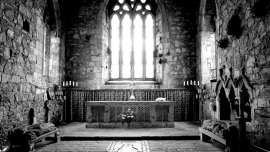The Apostles’ Church
This Sunday’s celebration of the great apostles Peter and Paul is a celebration of the Church.
Peter’s deliverance from jail is compared to the deliverance of Israel from Egypt. Like Israel he is rescued at Passover from “the hand” of his enemy by an “angel of the Lord” after girding himself with belt, sandals, and cloak (Exod. 3:8; 12:8, 11–12; 14:19).
The Church is, as Peter says, “all that the Jewish people had been expecting.” As he affirms in his great confession of faith in Sunday’s Gospel, Jesus is “the Christ,” the Messiah that the prophets had taught Israel to hope for.
But Christ is more than that what the Jewish people had been hoping for.
He is the Christ. But He is also, as Peter confesses, “the Son of the living God.” Born of the flesh of the Jewish people, he is a son of Abraham and David (Matt. 1:1; Rom. 1:3). Through Him and the Church founded on the rock of Peter’s faith, God fulfills the promise he made to Abraham—to bless all nations in his seed (Gen. 22:18).
What Christ calls “my Church,” is the new Israel, the kingdom of God, the family made up of all peoples—Jews and Gentiles—who believe that Jesus is the Christ, the Son of the living God (see Gal. 3:26–29; 6:16).
And we must make this confession our own. Jesus’ question, “Who do you say that I am?” is addressed to each of us personally.
We must confess our faith in Christ not only with our tongues, but with our lives. As Paul describes his discipleship in this week’s Epistle, we must make our lives a libation, an offering of love for the sake of Jesus and His kingdom (Rom. 12:1). We know, as we sing in this week’s Psalm, that the Lord has rescued us in Christ Jesus. We know that he will stand by us, giving us strength to face every evil—and that He will bring us to the heavenly kingdom we anticipate in this Eucharist.
St. Maximus of Turin (?-c.420)
Sermon CC 1
The Lord recognised in Peter a faithful steward to whom he entrusted the key of the Kingdom and, in Paul, a skilled master to whom he gave responsibility for teaching in the Church. So that those whom Paul has formed might find salvation, Peter must take them into their rest.
When Paul has opened hearts by his preaching, Peter will open the Kingdom of heaven to souls. So it is a kind of key that Paul, too, has received from Christ: the key of knowledge, enabling him to open up to their very depths hearts hardened towards the faith.
Then, in spiritual unveiling, it causes what was hidden within to appear in the light of day. This is a key that allows the confession of sin to escape from consciences and locks within them for ever the grace of the Savior’s mystery.
So both have received keys from the Lord’s hands: the key of knowledge for the one and the key of authority for the other; the former metes out the riches of immortality, the latter dispenses treasures of wisdom. For there are treasures of knowledge, as it is written: this mystery is Christ “in whom are hidden all the treasures of wisdom and knowledge,” (Col 2,3).

